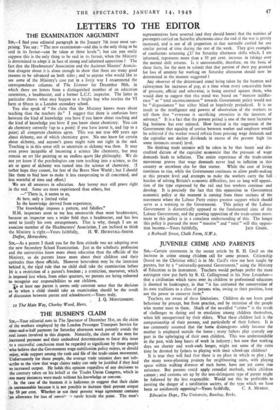LETTERS TO THE EDITOR
THE EXAMINATION ARGUMENT
SIR,—I find your editorial paragraph in the January 7th issue most sur- prising: You say: " The new examination—and this is the only thing to be said in its favour—can be taken at three levels "; but can you really suppose this is the only thing to be said in its favour, when the Ministry is determined to adopt it in face of strong and informed opposition ? The fact that the Headmasters' Association and the Assistant Masters' Associa- tion disagree about it is alone enough to show that there are many good reasons to be advanced on both sides ; and to anyone who would like to see some of the Ministry's case put in a lively way I recommend the correspondence columns of The Listener for December 30th, in which there are letters from a distinguished member of an education committee, a headmaster, and a former L.C.C. inspector. The latter in particular shows what may happen to a bright boy who reaches the VI form at fifteen in a London secondary school.
You also speak of " the claim that the Ministry knows more about teaching than the teachers do." I suggest that there is confusion here • between the kind of knowledge you have if you know about teaching and the kind of knowledge you have if you know about chemistry. You can do chemistry correctly (up to a point) if you have learnt it, and (up to a point) all competent chemists agree. This was not true 400 years ago about alchemy, out of which chemistry grew. No one knew for certain about alchemy, and anyone's guess might turn out right in the end. Teaching is in this sense still as uncertain as alchemy was then. It may even prove incapable of becoming a science like chemistry, but may remain an art like painting or an endless quest like philosophy. We do not yet know if the psychologists can turn teaching into a science, as the art or quest of alchemy was turned into the science of chemistry. (I rather hope they cannot, for fear of the Brave New World ; but I should like them to find how to make it less exasperating to all concerned, and less wasteful of time and effort.) We are all amateurs in education. Any heresy may still prove right in the end. Some are more experienced than others, but —" There is, it seems to us, At best, only a limited value In the knowledge derived from experience, The knowledge imposes a pattern, and falsifies."
H.M. inspectors seem to me less amateurish than most headmasters, because an inspector sees a .wider field than a headmaster, and has less need to justify his own arrangements. That is why, though I am an associate member of the Headmasters' Association, I am inclined to think the Ministry is right.—Yours faithfully, H. W. HECKSTALL-SMITH. Dufius, Morayshire.


































 Previous page
Previous page